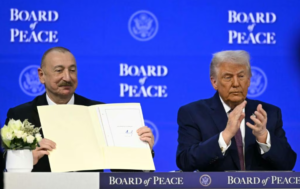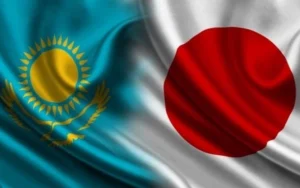Kazakhstan’s President Tokayev Addresses UN Assembly – An Analysis

Yesterday, President of Kazakhstan Kassym-Jomart Tokayev, at the General Debate of the 80th session of the UN General Assembly, gave a statement.
Kazakhstan has been a member of the United Nations since March 2, 1992, and sat on the UN Security Council for the 2017–2018 mandate, working on the non-proliferation of weapons of mass destruction.
UN–Kazakhstan Partnership: A Model for Multilateral Cooperation
Under the initiative of the Kazakh delegations to the UN in 1997, 1998, and 2000 respectively, the resolution “International Cooperation and Coordination of Activity with a View of Rehabilitation of the Population and Ecology and Economic Development of the Semipalatinsk Range in Kazakhstan” was adopted by the General Assembly of the United Nations.
As a member, it collaborates with UN agencies and country teams on issues of sustainable development, promotion of human rights and gender equality, and has hosted a UNHCR office for Central Asia. In other words, Kazakhstan is a crucial partner of the United Nations.
Today, Kazakh President Tokayev began by highlighting the pivotal role played by the United Nations in confronting global challenges for eight decades, such as common efforts on collective security, nuclear non-proliferation, peacekeeping, development, poverty reduction, sustainability, and human rights. He also underlined that the United Nations is a symbol of hope for millions of people.
However, he also stressed that the world is in bad shape by saying:
“But we must also face the truth: the world around us has changed profoundly – and, unfortunately, not for the better.” which creates a real crisis of trust in multilateral institutions, notably the serious violations of international law.
He made a call for:
- reforming the UN to make it better suited to the challenges of today and objectives of tomorrow.
- major powers of Asia, Africa, and Latin America to be represented in the Security Council on a rotational basis.
- while recalling the importance of underlining the voices of responsible Middle Powers.
As a reminder, Kazakhstan is a middle power that is beginning to have exemplary diplomacy on the international stage.
“Kazakhstan, middle power, giant in the making?” was the title chosen for the latest Strategic Note of the Choiseul Institute. Kazakhstan is an influential middle power in different areas such as: i) diplomatic authority; ii) high integration into international communities; iii) providing humanitarian assistance to states in need.
In his speech, Tokayev also emphasized the necessity of building a robust global security architecture. During his speech, he noted: “We advocate relaunching high-level dialogue among nuclear powers and stronger multilateral action to drastically reduce the looming threat of nuclear weapons.”
Special attention was paid to the Ukrainian crisis and the humanitarian crisis in Gaza.
The second part of his speech focused on Kazakhstan (and Central Asia) and its importance as a bridge between two continents. President Tokayev noted:
“Located in the very center of Eurasia, Kazakhstan is poised to play a crucial role as a logistics hub, handling 80% of all overland transit between Asia and Europe. We are investing tens of billions of dollars in our transport and transit infrastructure, including the Belt and Road Initiative, the North-South and the Trans-Caspian transit corridors. Kazakhstan will continue to develop regional supply chains that are the heart of the emerging global transport network. By 2029, we plan to build 5 thousand kilometers of new railway lines.”
In addition, he pointed out that Central Asia, with the five countries united, is working hard for the development of the region in peace and prosperity. The “Central Asian Five” are strengthening cooperation, proving that regional solidarity can be a powerful force for development and security.
Subsequently, a large part of his speech focused on environmental issues and global warming. It should be noted that Kazakhstan has made the question of the Aral Sea a real state-level problem. This is what the President emphasized: “As the current chair of the International Fund for Saving the Aral Sea, Kazakhstan will continue to play a proactive role in this common priority.”
As a reminder, Kazakhstan works closely with UN agencies, such as the United Nations Development Programme (UNDP), to support the economic growth of the country, modernize institutions, and manage natural resources. Last August, Kazakhstan and the UN signed an agreement for the creation of a regional center dedicated to sustainable development. The opening of the center marks an important stage in the cooperation between Kazakhstan and the United Nations, as well as in the country’s efforts to promote sustainable development throughout the region.
UN–Kazakhstan Cooperation: A Strategic Partnership for Sustainable Development
Yesterday, September 23, during his speech before the UN Assembly, he also noted that the Caspian Sea is rapidly shrinking. We call for urgent steps to preserve the Caspian water resources. While underlining the One Water Summit with France, Saudi Arabia, and the World Bank. While noting that Kazakhstan will host the Regional Ecological Summit in Astana in April next year.
President Tokayev has called on Caspian littoral states to intensify cooperation. Kazakhstan is emerging as a proactive player in global environmental cooperation, with a bold agenda driven by President Kassym-Jomart Tokayev. Since then, environmental policy has become a pillar of the Tokayev administration. Kazakhstan’s leadership was on full display at COP29, where President Tokayev was the first head of state to speak at the World Leaders’ Summit. Among the President’s most ambitious proposals is a Regional Ecological Summit, slated for next year in Astana. The Kazakh capital is set to host the Regional Climate Summit 2026 (RCS 2026), a landmark event aimed at boosting regional cooperation on climate change.
Over the past 30 years, Kazakhstan and the United Nations have built a robust and evolving partnership. Initially focused on technical assistance, the collaboration has matured into a strategic alliance aimed at addressing complex development challenges
Key Milestones:
- 400+ projects implemented across sectors such as health, education, gender equality, environmental management, and economic diversification.
- 27 UN entities currently operate in Kazakhstan, with offices in Astana and Almaty.
- The UN Sustainable Development Cooperation Framework (UNSDCF) 2021–2025 guides joint efforts to achieve the 2030 Agenda
Good to remember that Kazakhstan was the first country in the developing world to establish a national Emissions Trading System (ETS), introduced in 2013.
Furthermore, special attention was given to AI. He emphasized Kazakhstan’s interest and investment in Artificial Intelligence. He noted that in Kazakhstan, Artificial Intelligence will be integrated across all sectors of the economy and public services.
He ended his speech by mentioning the political reforms made by Kazakhstan in its democratization process and its possibility of moving to a single-chamber Parliament for a national referendum to consider, with the goal of being more transparent, effective, and reflective of people’s aspirations.
As a reminder, the UN works with the government and civil society to promote human rights and improve governance in Kazakhstan. Indeed, the cooperation between the Republic of Kazakhstan and the United Nations (UN) in the field of human rights protection represents a significant aspect of the country’s foreign policy. This stems both from Kazakhstan’s aspiration to strengthen its international standing and its need to implement sustainable democratic and socio-economic transformations according to Aidarkyzy, A. A. (2025). Non-governmental organizations (NGOs) play a primary and arguably the most important role in the country’s human rights system. Kazakhstan has over 20 major NGOs working on human rights at various levels, including monitoring law enforcement practices, documenting violations, and providing legal assistance to victims of rights violations.
The author wrote that: “For instance, the Kazakhstan International Bureau for Human Rights and Rule of Law (KIBHR), the Kazakhstan Helsinki Human Rights Federation, the Public Foundation ‘Institute of Equal Rights and Equal Opportunities,’ and the ‘Young Lawyers Club’ Foundation bring together legal professionals and human rights advocates to promote legal awareness and monitor compliance with human rights standards.”
Since Kazakhstan has been a member of the UN, Kazakhstan and the UN have become important partners to each other. Kazakhstan exercises influential diplomacy in numerous fields such as ecology (Kazakhstan’s Water Resources Management Concept), social and sustainable development, peacekeeping, development of international law, respect for human rights, gender equality, … It is also important to highlight that the country has since led international disarmament initiatives. Kazakhstan signed the United Nations Framework Convention on Climate Change in 1992.
It is important to keep in mind that Kazakhstan plays a growing peacemaker role in its cooperation with the United Nations, positioning itself as a neutral broker and regional stabilizer in an increasingly fragmented world. Kazakhstan has actively supported preventive diplomacy through the UN Regional Centre for Preventive Diplomacy for Central Asia (UNRCCA) and has hosted consultative meetings among Central Asian leaders to foster regional cooperation. In the South Caucasus, Kazakhstan played a key role in facilitating dialogue between Armenia and Azerbaijan, with Almaty serving as a platform for U.S.-backed peace talks. Kazakhstan Deployed also Peacekeeping Contingent to UN Mission in Lebanon in november 2023.
CONCLUSION
Kazakhstan’s role in Central Asia is really important considering the fact that it is the first power in the region. During the past 25 years, UN agencies have supported the Government’s efforts to prepare and implement a large number of strategies, programs and legislation related to macro-economic reforms, social issues, gender equality, improvement of health and environmental management. Since its independence, Kazakhstan became an active participant in international programmes, projects, conventions and agreements developed under the aegis of the United Nations Organizations. For the last few years, the international community has been observing the development of democracy and the steady market economy in Kazakhstan.


